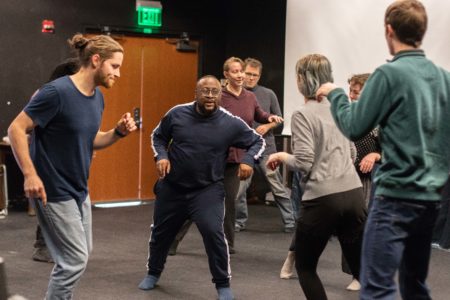Tony Miyambo’s one-man performance of “Kafka’s Ape,” an adaptation of Franz Kafka’s short story “A Report to an Academy,” will be performed tonight in Flanagan Theater. The performance is a part of the Center for the Humanities programming for the academic year: Dis/Unity and Difference.
“Any dimension of distinction, perhaps disagreement, perhaps moving beyond difference and finding reconciliation are themes that we’re interested in,” said Vance Byrd, interim director of the center for the humanities and professor of German.
The play, adapted and directed by Phala O. Phala, follows a formerly captive ape named Red Peter, who escapes his cage and becomes “humanized” by imitating humans in order to survive. Phala speaks to an audience at a scientific convention to explain how he has developed to seemingly become more human than ape. The play delves into themes of difference, identity, humanity and otherness.
For Miyambo, physicality is a crucial aspect of his performance as Red Peter. Embodying the character of the ape without assistance from prosthetics or exaggerated costuming requires special attention to movement.
“The commitment to the characterization had to be physical in an intense way but that is [sic] also truthful to the complexity of an ape that is an animal at heart but that is negotiating himself between being an animal and being more human,” he said.
Miyambo has performed “Kafka’s Ape” across the globe, including in Amsterdam, California and South Africa. Following tonight’s performance in Grinnell, he and stage manager Gogo Mapitsi Lieketso Mohoto-WaThaluki will tour with the play to locations including Dubai, the Czech Republic, Cape Town and Rwanda. Each location provides an opportunity for Miyambo and Lieketso to consider political or cultural influences that may affect audiences and their interpretations of the performance in different ways.
“We try to have a level of awareness about the context we’re performing in, what the issues are. For example, when we performed the show in California, we were very much aware of the Black Lives Matter movement and the complexity around those ideas and identities. And I think here, it’s been about understanding kind of what it means to live in a small quiet town and how identity manifests often in this place and this time,” Miyambo said.
As per the Center for the Humanities’ theme of Dis/Unity and Difference, the performers hope to encourage conversations and dialogue on topics such as otherness. In this sense, the audience has an active role in observing and making meaning of the play, whatever that may mean to each individual.
“I think a performance is only as powerful as the people who engage in it. So if people choose to come and watch the work and not be engaged, there’s nothing Tony and I can do about that. But if they choose to have a conversation about whatever it is that strikes them about the work and to attach that to how society works and how they position themselves politically, then I think it [the performance] can have a lot of power because that means that it can splinter into all kinds of conversations that we can’t anticipate,” said Lieketso.
“Kafka’s Ape” touches on innumerable themes depending on each audience member’s personal experience. The onus is ultimately on audience members to respond to the play and to continue a dialogue.
“We’re both powerful and powerless at the same time, and I think all theater is like that. It can be incredibly powerful, but it is like potential energy. If the energy doesn’t get used, it will stay potential,” Lieketso said.
Despite the myriad of potential conversations that may result from “Kafka’s Ape,” Miyambo located one overarching theme uniting each of its performances: empathy.
“If people can leave here with an overwhelming sense of empathy: empathy for each other, empathy for the other, whatever the other might be. The other might be black, the other might be an animal, the other might be homosexual. … Anything that can be located in otherness, I think the key to really having open and honest dialogue is empathy, and that’s kind of the one thing I always try to make sure people come away with from the show,” he said.





























































